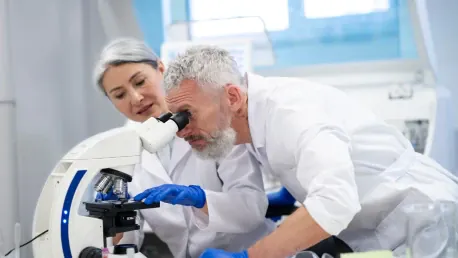In a significant stride for cancer detection, Mursla Bio recently announced encouraging results from its multi-center clinical study, MEV01, which focuses on the early detection of liver cancer, particularly Hepatocellular Carcinoma (HCC), using their innovative dynamic biopsy technology. Conducted in partnership with prominent academic institutions including University College London, Imperial College London, University Hospital of Santa Maria, and Medical University of Graz, the study marks considerable advancements in detecting cancer among high-risk, cirrhotic patients. The EvoLiver™ test provides a potentially transformative approach to liver cancer surveillance, presenting a more sensitive and convenient method than current techniques.
EvoLiver™ Test and Its Impact on Liver Cancer Detection
Advancement in Cancer Biomarker Identification
EvoLiver™ represents Mursla Bio’s dynamic biopsy-based blood test which has achieved remarkable sensitivity and specificity in identifying liver cancer. This blood test leverages organ-specific hepatocyte extracellular vesicles (h-EVs) to establish the first-ever EV multiomics biomarker signature for HCC. Demonstrating 86% early-stage sensitivity and 88% specificity, EvoLiver™ surpasses existing methods such as ultrasound and alpha-fetoprotein (AFP) testing which often fail to detect small tumors, particularly in overweight or obese patients. These characteristics underscore EvoLiver™’s potential in revolutionizing liver cancer surveillance and improving patient care outcomes by enabling early detection and timely intervention.
The study was based on an analysis of 464 patient samples hailing from a western population suffering from conditions like Metabolic-Associated Steatohepatitis (MASH)/fatty liver disease, alcoholic liver disease, and hepatitis. Among these high-risk groups, the ability to detect HCC at an early stage can make a crucial difference, allowing access to effective treatments such as ablation, resection, or transplantation. Therefore, the introduction of EvoLiver™ is not only a breakthrough in the detection realm but also a substantial step towards enhancing survival rates and quality of life for patients.
Overcoming Limitations of Existing Surveillance Methods
Current surveillance methods often burden healthcare systems because they struggle to detect small tumors effectively. Typically, ultrasounds and AFP tests fail to identify early-stage tumors in patients with higher body weights, creating an economic strain on healthcare resources due to the necessity of more frequent and complex examinations. EvoLiver™ offers a straightforward, blood-based alternative that displays improved sensitivity and could significantly boost patient adherence to surveillance programs. This could streamline disease management, making early detection more accessible and decreasing treatment costs over time.
EvoLiver™ test employs fewer than 10 essential h-EV microRNAs and proteins to identify novel HCC biomarkers, enhancing the precision of early detection. By tapping into advanced Extracellular Vesicle (EV) science and a comprehensive extracellular omics approach, Mursla Bio’s dynamic biopsy technology integrates the accuracy and disease-subtyping advantages of tissue biopsies with the simplicity of liquid biopsy sample collection. This groundbreaking method offers comprehensive biological insights and promises to set a new standard in the field of cancer surveillance, enhancing the overall landscape of cancer diagnostics.
A Glimpse into Future Developments for EvoLiver™
Presentation and Future Publication of MEV01 Results
Dr. Tomás Dias, Mursla Bio’s Chief Scientific Officer, publicly presented the promising results of the MEV01 study at the American Association for the Study of Liver Diseases (AASLD) Liver Meeting in San Diego on November 17, 2024. This key presentation highlighted the robustness and accuracy of the EvoLiver™ test, drawing attention from both the scientific community and healthcare professionals worldwide. Such developments suggest a significant shift toward more reliable and non-invasive techniques in liver cancer detection specifically tailored for high-risk populations.
Looking ahead, Mursla Bio plans to publish the final results of the MEV01 study in 2025, further validating the findings and consolidating the scientific basis for EvoLiver™’s efficacy. The company aims to offer EvoLiver™ as a Laboratory Developed Test (LDT) in the US, bringing this innovative solution closer to those who need it the most. Extensive, larger studies are also in the pipeline to secure FDA approval and widespread reimbursement coverage, paving the way for broader adoption of this revolutionary diagnostic tool.
Accelerating Adoption and Improving Patient Outcomes
In a significant advancement for cancer detection, Mursla Bio has reported promising outcomes from its multi-center clinical study, MEV01. This research focuses on the early detection of liver cancer, specifically Hepatocellular Carcinoma (HCC), through their groundbreaking dynamic biopsy technology. The study, executed in collaboration with top-tier academic institutions like University College London, Imperial College London, University Hospital of Santa Maria, and Medical University of Graz, signifies substantial progress in identifying cancer in patients at high risk, especially those with cirrhosis. The EvoLiver™ test could revolutionize liver cancer screening, offering a more sensitive and convenient method compared to current practices. This progress brings hope for better patient outcomes through early intervention and more effective monitoring. In essence, Mursla Bio’s innovative approach may set new standards for liver cancer surveillance, making early detection more accessible and potentially improving survival rates for high-risk patients.









